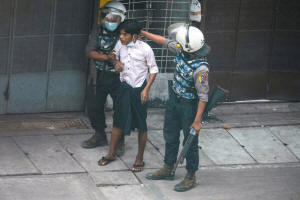Myanmar security forces kill nine as Indonesia calls for end to violence
 Send a link to a friend
Send a link to a friend
 [March 19, 2021]
(Reuters) - Myanmar security forces
shot dead nine opponents of a Feb. 1 coup on Friday, a funeral services
provider and media said, as Indonesia urged an end to the violence and
the restoration of democracy, in an unusually blunt call from a
neighbour. [March 19, 2021]
(Reuters) - Myanmar security forces
shot dead nine opponents of a Feb. 1 coup on Friday, a funeral services
provider and media said, as Indonesia urged an end to the violence and
the restoration of democracy, in an unusually blunt call from a
neighbour.
Military and police have used increasingly violent tactics to suppress
demonstrations by supporters of detained elected leader Aung San Suu Kyi,
but that has not put off the protesters, with crowds turning out again
in several towns.
Security forces opened fire in a confrontation in the central town of
Aungban as they tried to clear a protesters' barricade, media and a
witness reported.
"Security forces came to remove barriers but the people resisted and
they fired shots," the witness, who declined to be identified, said by
telephone.

An official with Aungban's funerary service, who declined to be
identified, told Reuters eight people were killed, seven on the spot and
one wounded person who died after being taken to hospital in the nearby
town of Kalaw.
The spokesman for the junta was not immediately available for comment
but has previously said security forces have used force only when
necessary. Critics have derided that explanation.
One protester was killed in the northeastern town of Loikaw, the Myanmar
Now news portal said, and there was some shooting in the main city of
Yangon, but no word on casualties.
Demonstrators were also out in the second city of Mandalay, the central
towns of Myingyan and Katha, and Myawaddy in the east, witnesses and
media reported.
The total number killed in weeks of unrest has risen to at least 233,
according to the latest report and a tally by the Assistance Association
for Political Prisoners activist group.
'NO MORE VICTIMS'
Western countries have condemned the coup and called for an end to the
violence and for Suu Kyi's release. Asian neighbours, led by Indonesia,
have offered to help find a solution but a March 3 regional meeting
failed to make headway.

The 10 countries of the Association of Southeast Asian Nations (ASEAN)
has long held to the principle of not commenting on each other's
internal affairs, but there are growing signs the Myanmar crisis is
forcing a reassessment of that.
In some of the strongest comments from a regional leader on the
crackdown, Indonesian President Joko Widodo called for democracy to be
restored and for the violence to stop.
"Indonesia urges that the use of violence in Myanmar be stopped
immediately so that there are no more victims," Jokowi, as he is known,
said in a virtual address.
"The safety and welfare of the people must be the top priority.
Indonesia also urges dialogue, that reconciliation is carried out
immediately to restore democracy, to restore peace and to restore
stability."
[to top of second column]
|

Riot police officers detain a demonstrator during a protest against
the military coup in Yangon, Myanmar, March 19, 2021.
REUTERS/Stringer

Myanmar's coup leader, General Min Aung Hlaing, took part in a video
conference with regional defence chiefs on Thursday, his first
international engagement since seizing power, state television
showed.
At the meeting, the head of Indonesia's armed forces, Hadi Tjahjanto,
expressed concern over the Myanmar situation, the Indonesian
military said on its website. Indonesia's army ruled for years but
eventually completely withdrew from politics.
Singapore has also spoken out against the coup and the killing of
protesters.
Its military chief, Lieutenant-General Melvyn Ong, expressed his
"grave concern" at the meeting and urged Myanmar to avoid lethal
force, the Singapore defence ministry said.
REPORTERS DETAINED
In Geneva, U.N. human rights experts denounced forced evictions,
arbitrary detentions and the killings of protesters. They said
foreign governments should consider pursuing those responsible for
crimes against humanity.
The European Union is set to impose sanctions on Myanmar's armed
forces to target businesses they run.

Nobel peace laureate Suu Kyi, 75, has been detained since the coup
and faces accusations of bribery and other crimes that could see her
banned from politics and jailed if convicted. Her lawyer says the
charges are trumped up.
The army has defended its takeover, saying its accusations of fraud
in a Nov. 8 election swept by Suu Kyi's party were ignored by the
electoral commission. It has promised a new election but not set a
date.
Information within Myanmar is becoming increasingly difficult to
verify after authorities have restricted the internet services that
protesters use to organise and report.
The U.N. human rights office said this week about 37 journalists had
been arrested and two more were detained in the capital, Naypyitaw,
on Friday while covering a hearing for an arrested member of Suu
Kyi's party, said the Mizzima news portal, the former employer of
one of them, Than Htike Aung.
The other detained reporter was Aung Thura of the British
Broadcasting Corp (BBC). The BBC said they were taken away by
unidentified men and it called on authorities to help find its
accredited journalist and confirm he was safe.
(Reporting by Reuters Staff; Writing by Ed Davies and Robert Birsel;
Editing by Stephen Coates and Clarence Fernandez)
[© 2021 Thomson Reuters. All rights
reserved.] Copyright 2021 Reuters. All rights reserved. This material may not be published,
broadcast, rewritten or redistributed.
Thompson Reuters is solely responsible for this content.
 |